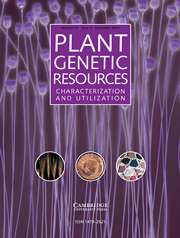No CrossRef data available.
Article contents
Storage duration increases oxidation products in peanut seeds
Published online by Cambridge University Press: 14 October 2021
Abstract
Seeds kept in long-term storage are essential for maintaining genetic resources of crops and other plant materials in seed banks and national germplasm systems. But seeds undergo chemical changes over time as part of the ageing process that result in reduced germination rates and seedling normalcy. For example, oilseed crops such as peanuts are particularly vulnerable to oxidation and rancidification due to their high oil content. To test the effect of storage time on seed oil in peanuts, we grew different accessions and harvested fresh seeds to compare the oil composition of new seeds with seeds aged in storage for varying lengths of time. Out of the nine fatty acids detected and measured by gas chromatography, five including oleic, gadoleic, behenic, lignoceric and cerotic acids differed significantly between new and old seeds. Additionally, old seeds accumulated up to four oxidation products together averaging about 1% of the total oil composition. The concentration of these oxidation products was positively correlated with the age of the seeds, increasing linearly up to more than 6% of the total in the oldest seeds. The presence and concentration of oxidation products measured using simple chromatography techniques can be used as an initial indication of quality and viability in older seed inventories stored in germplasm repositories.
- Type
- Short Communication
- Information
- Copyright
- Copyright © The Author(s), 2021. Published by Cambridge University Press on behalf of NIAB


